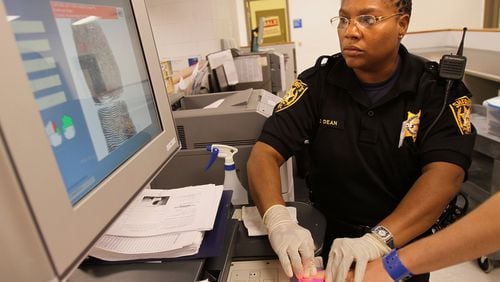The Trump administration has quietly expanded an immigration enforcement program in Georgia, signing new agreements to team up with the sheriff’s offices in Bartow and Floyd counties as well as the Georgia Department of Corrections.
Last month, those entities signed paperwork with U.S. Immigration and Customs Enforcement to join the 287(g) program. Named after the 1996 federal law that authorizes it, the program deputizes state and local officials to help ICE investigate, apprehend, detain and transport people facing deportation.
President Donald Trump called for an expansion of the program in January of last year. Since then, it has grown rapidly. Before July of last year, there were 42 287(g) agreements nationwide. Now there are 75. Four other counties in Georgia — Cobb, Gwinnett, Hall and Whitfield — already participate.
RELATED: Immigration enforcement program could be expanded in Georgia
Floyd Sheriff Tim Burkhalter said Wednesday the program was still in the “preliminary stages of implementation” in his county.
“Our deputies will be trained by ICE before we actually start,” he said in an email. “We are currently awaiting this training.”
Bartow Sheriff Clark Millsap did not immediately respond to a request for comment Wednesday morning. But in October he said his office had applied to join the program because he viewed it “as another tool for use in law enforcement. I see it as a way of being more proactive as the sheriff of Bartow County.”
The Georgia Department of Corrections also did not immediately reply to a request for comment Wednesday. But in October the department confirmed it had applied to join 287(g) the month before.
Supporters of the program see it as a way to remove violent criminals from their communities and to deter illegal immigration. Opponents argue it drives a wedge between local sheriff’s offices and immigrant communities, making unauthorized immigrants fearful of reporting crimes.
The Washington-based Center for American Progress, a left-leaning policy organization, released a report this week that measures the economic contributions of immigrants living in communities with 287(g) agreements and points out that many unauthorized immigrants live in mixed-status families.
“Families in the immigrant community are made up of citizens, legal residents, and those lacking legal status, complicating the argument that lawfully present immigrants and U.S. citizens have nothing to worry about when it comes to immigration enforcement,” the report says. “Make no mistake — policies that target immigrants without legal status also harm native-born citizens. Children living in mixed status families are particularly vulnerable after a parent’s detention and deportation, which most often results in the loss of the family’s primary earner.”








